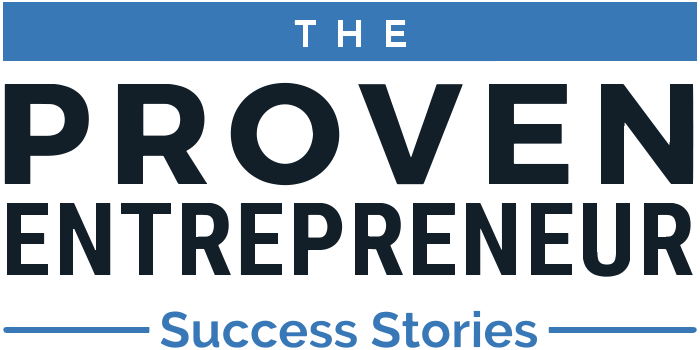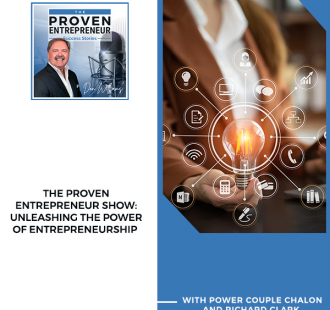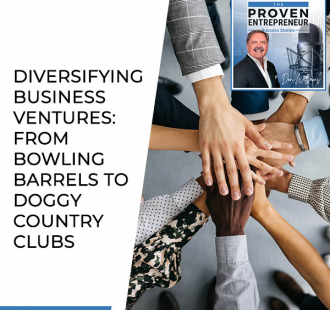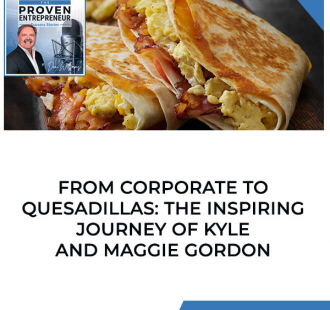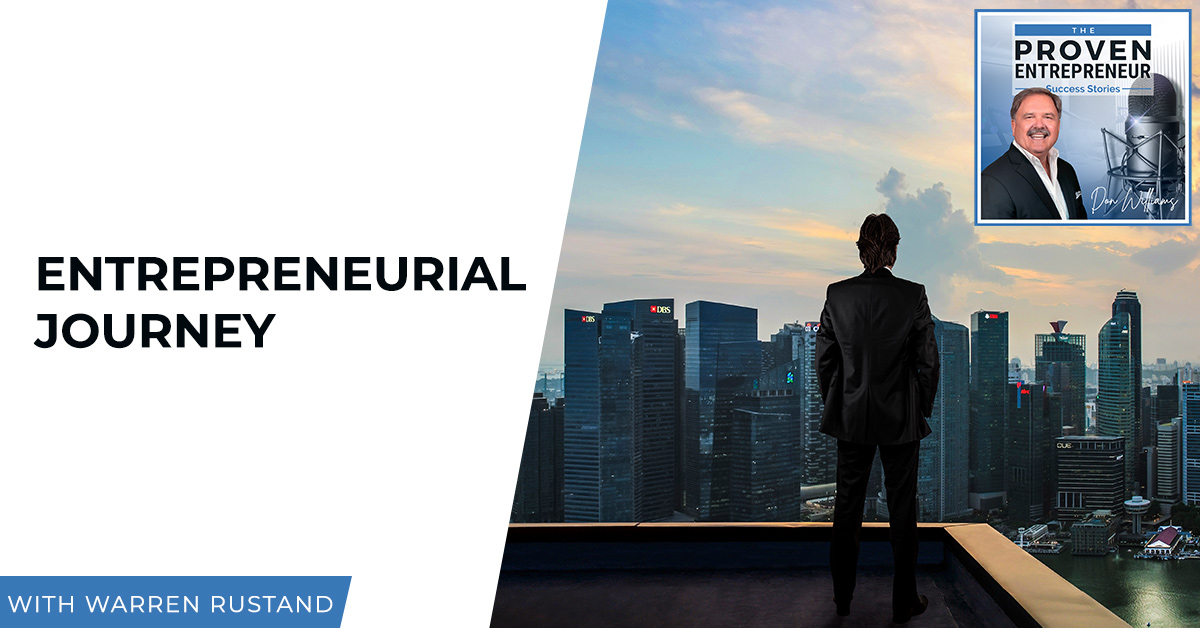
Often, some of the best entrepreneurial journeys start with humble beginnings. Stories full of grit and being at the right place and time and with the right skills make for great inspiration. This episode’s guest is one whose own journey is nothing short of that. Warren Rustand joins Don Williams to share with us how he went from Minnesota Farm Boy to White House Fellow to WPO Global Chair & EO Dean of Learning. Witnessing leadership at such a special time, he takes us to that period when he worked with the former President of the United States, Gerald R. Ford, and later on pursued his entrepreneurial endeavors. He then shares the highs and lows of business and the lessons he learned throughout his journey. Follow along with Warren and Don as they lend us some wisdom on what it takes to be an entrepreneur, battle scars and all.
For information on how to work with Don visit Work With Don Williams
You can also reach out to Don Williams at https://donwilliamsglobal.com
Please join Don and his businesses in support of St. Jude’s Children Research Hospital in its Mission to cure Childhood Cancers. You can donate to St. Jude at stjude.org/donate
—
Watch the episode here
Listen to the podcast here
Warren Rustand’s Entrepreneurial Journey
Minnesota Farm Boy To White House Fellow To WPO Global Chair & EO Dean Of Learning
I have a treat for you. He is a very good friend. He is a gentleman I consider a mentor. He is somebody I’ve known for 5 or 6 years. I know a lot of his story, but he’s going to share it with you. Warren Rustand, welcome to the show.
Thank you very much. It is great to be with you. I’ve been looking forward to this. I know we’ll have a fun conversation.
It is so good to see you. I haven’t seen you in a while. Let’s start here. What are you doing? What’s happening in your entrepreneurial path at Summit Capital in Tucson, Arizona?
We’re always looking for interesting opportunities, and we have one. We’re involved in a company that is in the IT staffing business, focusing on cybersecurity. There is a big demand for that space, particularly by the federal government, state governments, and so forth. Generally, there is a great demand in that space and not nearly enough people to employ in that space. It’s a good opportunity and a lot of fun as we are building that company. We are having a lot of fun with it.
It’s a great growth area. There is a lot of demand. I want to take you all the way back to young Warren from ages 5 to 18 in your home. Was there an entrepreneur who set an entrepreneurial example for you as a young Warren?
Indeed, there was. My father was an entrepreneur. He was a college-educated man who went to work in Minneapolis, St. Paul in the corporate world. When his mother and father suddenly died, his eleven brothers and sisters asked him to come and run the family farm. He had not thought he would ever farm. He did that for his brothers and sisters and went to running the family farm.
Most farmers in the wintertime in Minnesota sit around, watch it snow, and stay inside where it’s not so cold. He went out and began to sell financial instruments. Those were from life insurance to stocks and bonds to other kinds of things. In the off-season, if you will, or the non-farming season, he was making money. He used that money to buy out his eleven brothers and sisters. He owned the farm himself, and then he bought another farm.
Soon, he had a couple of farms doing very well but decided he wanted to do other things. He packed up the family when I was twelve years old and headed out to Southern California. It was a place that he’d experienced when he went through there during the war. Like the weather, it was much better than Minnesota. We ended up in Southern California, and he got involved in real estate development.
At the time in the ‘50s and early ‘60s, Disneyland was coming out of the ground and being established. There were lots of orange groves, citrus fields, flower gardens, truck gardens, and all kinds of things. All that turned into housing and so forth. He was there at the right time and right place and did very well. I grew up from the time I was 12 until I was 18 in Southern California. A big thing at that time was surfing and The Beach Boys. They were starting to talk about surfing, so I did some of that.
I played some basketball. When I was eighteen, I decided to go off to the university. I had some offers to play basketball but ended up at the University of Arizona when I was eighteen years old, playing basketball and having fun. That was my first eighteen years on an isolated, small, and cold farm in Minnesota. I grew up on the farm.
We were three miles from the nearest village. It was 167 people and was three miles away. The nearest town of any consequence was 10 miles away, and that was 1,000 people. A city was 25 miles away. It was Fergus Falls, Minnesota, which is east of Fargo, North Dakota. It’s not far from the Canadian border. It was cold, gray, and tough. It had hard conditions and all the good things I needed to learn. I then got to visit Southern California. That was a good place, too.
What a blessing, growing up in Minnesota and then ending up in Southern California. We share that heritage a little bit. My grandmother immigrated from Norway when she was eleven. She was 1 of 12 brothers and sisters. They were all farmers. I don’t even think there was a town nearby. It was Dazey, North Dakota, which is nowhere. A lot of them are still there. Thank you for sharing that. Tell me about your first job or your first entrepreneurial activity when you were a child. When was the first time that you earned money?
The first time I earned money, I was probably 15 or 16 years old. I got a summer job helping which was then the Fuller Brush man who sold products door-to-door. He needed somebody to fulfill those products by putting them in bags, packaging them up, and then taking them to the person who had bought them. I was the fulfillment side of his selling side. That was a great experience to watch him sell, and then fill the orders, take it out, make sure that they got delivered, and so forth. I got paid real money for that.
I started when I was fifteen. I did a couple of summers. I did the usual taking care of lawns and getting paid for that. Early on, it was made known to me that I needed to make some money. We needed to do that. My father, shortly after we got to Southern California, had gone to the doctor. He had a heavy cold. He wanted to get a shot to get him through this cold because it was very difficult for him.
The doctor made a mistake. He pulled the wrong medicine off the shelf. Instead of giving him penicillin, he gave him cortisone. My dad was allergic to cortisone, so it froze all of his internal organs. He was, at best, given twenty years to live from that point in time. He was in his late 30s. He was sick for a long period of time. He didn’t have any health insurance or anything else.
He was in the hospital for 99 days, so everybody in our family had to go make a living. We had to make money. We had to pay off the bills and put food on the table. It was a pretty challenging time for about two years until my dad got back on his feet. He got back into real estate and so forth. We learned to go without. We learned to be frugal. We learned to do those things that all of us have to learn at some point in our life.
Being Norwegian, like you, we know what that’s about. Our families went through tough times in Norway. That’s why they came to the United States. I learned to take care of money, which was important, and protect the assets that we had. It was a good time for learning. I played basketball after the University of Arizona for a little while.
You played basketball after the University of Arizona. You got to tell us a little bit about that. Where did you play basketball?
I had an opportunity at the University of Arizona to play on good teams and have some success. I had an opportunity to play on the US team and went to the World Basketball Championships in Santiago, Chile. We won a medal there. That was fun. I got drafted by the Golden State Warriors, so I had a chance to play at that level for a little while. It was not very long because they realized that I didn’t have the talent to play at that level. They needed to find people that had the talent. I got to play a little bit there, and then went off and played with the number one amateur team.
There were no minor leagues in basketball at that time like the D League or the G League. There was AAU Basketball or Amateur Athletic Union Basketball. It was amateur basketball. I got my amateur status back, went, and played for the Phillips 66ers in Bartlesville, Oklahoma. They were the number one amateur team in the United States. We traveled all over the United States and played for the national championship. I had a great time. It was a lot of fun.
I got recruited to go back to the University of Arizona as the assistant basketball coach at a division one school. I did that for three years and earned a little money there. I had some fun doing that while I got my Master’s degree. I got recruited into the business world. A guy that had been a previous basketball coach came and talked to me about getting into the financial services industry. They had a small business that wasn’t doing very well. They thought that maybe I could help grow it and created some incentives for me to do that. We were successful at that and had a good time.
I got out of that and started another business. I did a startup in the financial services space and built that. That did fine. I sold that. Somebody told me about the program called the White House Fellows Program and thought I should apply, so I did. There were 14,000 applicants or something the year I applied and 17 of us were chosen as White House Fellows. All of a sudden, I ended up in Washington, DC at the ripe old age of 29 years old. I had a lot of fun along the way.
Tell the audience a little bit about what the job of a White House Fellow is.
The White House Fellow is like the Rhode Scholarship program except it’s only for US citizens that are based in the United States. It was created by President Lyndon Johnson and his Head of Health and Human Services, a guy named John Gardner. They wanted to bring exceptional young people, not as an internship or a postgraduate degree, but people who were in the early stages of their careers that had demonstrated success. They wanted them to come back and spend a year working at the highest level of the US government, meaning the White House and White House agencies. You then return back to your communities and use what you’ve learned to help build your community.
I had never heard of the program until a retired four-star general gave me an application for it. He gave it to me over lunch. I said, “Fine.” I put it in my desk drawer and didn’t think another thing about it. I was moving offices one day. I opened that desk drawer to clean stuff out and there was that application. I noticed it was due the next day, so I spent all night filling it out and writing a 200-word essay for the president on healthcare or something. I sent it in, never expecting to hear another thing.
About three months later, I got this interesting letter from the White House Fellows Commission. It said, “Congratulations. You’re one of several hundred semi-finalists. You can choose from any 1 of 10 regions to go be interviewed.” They spread ultimately all these people over ten regions. There were members of the White House Fellows Commission there. I spent three days being interviewed. It was fun because I met Heisman Trophy winners, astronauts, and authors. It was fantastic for me. I’m a kid from Tucson, Arizona. This was good. I was never thinking I would ever be chosen for anything like this.
The job of these ten centers of interviewing was to choose their first choice and then, an alternate to recommend as national finalists. At the end of three days, they called us together for a luncheon and announced who that was. Lo and behold, I was their first choice. I was stunned. I almost fell out of my chair. I’m a country bumpkin from Minnesota. What do I know?
I was 1 of 37 national finalists. We went back to Washington, DC. They took us out to a place called the Airlie House, which is a diplomatic retreat in Northern Virginia. There were no phones or TVs. There was nothing. For six days, we were interviewed by the President’s Commission on White House Fellows. It was headed by someone you’ve heard of, Dr. Milton Friedman. He is a pretty well-known economist from the University of Chicago.
All sixteen people on that were household names. They were people I’d want to meet. By the time we got there, they’d done a full FBI field investigation on us. They had 100 pages of information starting from the day we entered school until the present time. They could ask us anything they wanted to ask us. I walked into my first interview and there were 6 or 7 of the commissioners in there.
Dr. Friedman, who happened to be leading that particular panel, said, “It’s nice to have you here. Senate Bill 2454 has several positions that affect someone in the private sector. Could you please explain those tax positions relative to the private sector and explain how it affects you and your business?” If I didn’t know anything about that bill, I’d have been blown up, but I happened to know a little bit about that bill and what the tax implications were. I got through my first piece. There were six days of that stuff.
In the end, out of the 37, they had to choose 20 or fewer to be White House Fellows. They had an auditorium they were going to march us into early one morning and so forth for the last day. I couldn’t sleep very well the night before that so I got up and wandered around. I found the auditorium where they were going to get us.
There were two boxes in the auditorium, and each box had envelopes in it. One box had thin envelopes that said, “You’re a nice person, but you’re not a White House Fellow. Have a good life.” The other box had a fatter envelope in it and said, “Congratulations. You’re a White House Fellow. Here are your further instructions.” I found my name on the thin envelope, so I had enough time to change it to a fat envelope in time for people to come in. I got to be a White House Fellow. It was fantastic. It was terrific.
You tell us so well. I know the story. There are many great moments during your career as a White House Fellow, but there’s one of which there’s no equal. Would you mind sharing that?
There are several you may be referring to. One was on the tennis court. Are you referring to the one on the tennis court?
Maybe I’ll get two because that one’s funny, but there’s one that was a huge historical implication where you were in a room.
As a White House Fellow, I was chosen to work for the Vice President of the United States. The President was Richard Nixon at that time and the Vice President was Spiro Agnew. When Spiro Agnew heard that I was coming to town to be his White House Fellow, he resigned. He couldn’t handle the pressure. It was too tough for him. I came to Washington a man without a vice president.
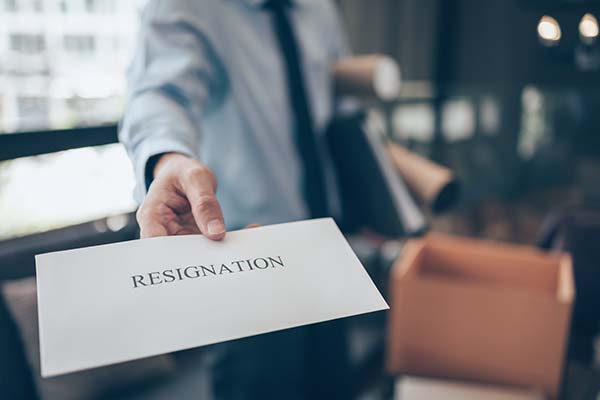
I hooked up with the Secretary of Commerce, Fred Dent. He asked me to lead the first executive trade mission to the Soviet Union ever in US history. I did that and negotiated trade agreements for a while. I came back and hooked up with then-Vice President Gerald Ford who’d been nominated to that position by President Nixon and approved by the United States Senate. He was Vice President. He asked me to work with him, and I did as a White House Fellow. I was working every day.
That was the last 9 months or 10 months of a big scandal in this country called Watergate. It probably was the biggest scandal that the US government’s ever had. It went on for months. Finally, it went to the Supreme Court whether or not the secret tape recordings that Richard Nixon had done in the Oval Office would be allowed to be heard publicly. If they were, were there any implications for the president as to the cover-up of a felony?
One night, the Vice President and I were working alone in his office and got a call from then-General Alexander Haig who was Chief of Staff to the president. He said, “May I speak to the Vice President?” I said, “Yes.” He said, “Can I come over?” I said, “Yes.” He came over and stood in front of the Vice President. He said, and these are famous words that have been written in a lot of books, “Mr. Vice President, prepare to be President.” That means that the Supreme Court had ruled that the tapes indeed implicated the President in a cover-up. Most of us knew at that point he had two choices. He would be impeached or he would resign, but he would not be able to stay in office.
I didn’t know if the Vice President had ever thought about being President of the United States because he’d been out defending the President, the party, and so forth. Without hesitation, he turned to me and said, “Have the following six people in my office tomorrow at 7:00 AM for a transition team meeting.” He not only had thought about it, but he knew who the people would be that would be his closest advisors. We sent out airplanes and made calls. Those people arrived the next morning for what became the transition to the presidency of the United States for Gerald Ford. It was only two days long.
On the evening of August 6th, 1974, the President of the United States resigned. Noon of August 9th, 1974, I led the then-Vice President into the East Room of the White House. I stood near him as he was sworn in as President of the United States and gave his inaugural speech. It was an amazing time in American history. At 30 years old, I happened to be a guy who was there and got to learn from it. I got to see things that happened and that went on.
When that transition team met for the first time that morning, I wondered again, “Did he have the plan to transition to the President??” He pulled from his pocket probably five handwritten pages of exactly how the transition was going to work, who was going to do what, who had what accountabilities and responsibilities, and how the American government was going to continue to work. It was an amazing time to watch leadership at the highest possible level and to understand what leadership was all about in that context. It was a wonderful experience in history for me. It was a great time. I learned a lot. It was a lot of fun being there. I traveled all over the world on Air Force One. It was a great experience.
The strength of, at the time, Vice President Ford’s leadership, he knew exactly who he wanted to call. By the next morning, he had his plan entirely lined out. He was not winging it. He was prepared. That’s amazing. You got to follow it with the funny tennis court story, though.
We had a small group that played tennis on the White House tennis courts whenever the weather would allow them and whenever we were in town. One particular day, we were playing tennis. It was Gerald Ford, Don Rumsfeld, who went on to become the Secretary of State, and then George H. W. Bush, who went on to become President, and me as a young kid.
We were playing. Gerald Ford was at the net on one side. I was at the net on the other side. Don Rumsfeld was deep. George H. W. Bush was deep. We were having a rally going back and forth. Any of the tennis players who might be reading would know that if you hit a short lob to the person at the net, the person at the net can take 1 step or 2 back, put it away pretty easily, and win the point. Don Rumsfeld hit a lob shorter than he wanted to and I could get to it, so I took a couple of steps back.
Being a young athlete, I was like, “I’m going to hit this ball as hard as I possibly can and show them what a great tennis player I am.” I swing as hard as I can. I hit this ball. It came off my racket at a strange angle, and it hit the President of the United States right in the stomach. It was right in the diaphragm. He went down like a bull moose shot with a 30-06. He was down, face down.
We all ran over. The Secret Service ran over there. His friends ran over there. When we got to him, there were no obvious vital signs. We couldn’t hear him breathing. I think, “I have killed the President with a tennis ball for crying out loud. This is not a good situation.” My second thought is, “I’m now unemployed. There’s no way I’m going to continue to work for the President of the United States.” Pretty soon, he starts coughing, wheezing, and spitting. We help him up. He then dusts himself off, grabs the nearest Secret Service agent, points to me, and says, “Kill him.” It was not a good situation. I was like, “Mr. President.” We’ve had a lot of fun stuff like that that went on during that period of time.
We see the serious side of the White House, the President, and so forth, but there’s a whole other operating level where jokes are told and fun is had. Serious conversations go on. There are all kinds of tough decisions that have to be made, but there’s also this family familiar side to the White House. Since we work so hard together, we know each other so well. That’s a lot of fun that the American public would never see. They will never hear about that.
It’s backstage. It’s behind the curtain. Thank you for sharing that. Still going back to your early entrepreneurial journey, tell us about one of your first entrepreneurial ventures. It led you out of government service and back to the private sector.
George H. W. Bush and I were sitting and talking one day in the White House dining room about what we were going to do after the White House. He was the Head of the CIA at the time and the Secretary of the President. He said, “What are you going to do?” I said, “I don’t know. I’m an entrepreneur. I’ll go back to Arizona and figure it out.” That’s what entrepreneurs do. We figure it out.
That's what entrepreneurs do. We figure it out. Click To TweetHe said, “There’s a little company down in Louisiana. We know about it. They build cargo crew and utility boats for offshore oil platforms. We like that company. It’s being sold. It looks like a foreign interest. We’d rather keep that in US hands. Would you go down there and do a little analysis for me of the company? If it’s a good little company, I’ll have some of my friends maybe step up and buy it to keep it close to the US government.” I said, “Sure.”
I went down there and spent about three days. I love the company. It was a great little company. They had good leadership and good people. It was truly an entrepreneurial venture. It was on the bayou of the river down in Morgan City, Louisiana, the hotbed of offshore oil exploration. It was a town of 50,000 that had 45,000 people employed because of the offshore oil industry. They built boats that are anywhere from 125 feet to 360 feet long. I liked the company. It was a small company. It was $10 million in revenue and $1 million in net after tax. It had nice numbers.
I went back to the White House. He said, “How’d it go? Do you like the company?” I was like, “Yes. I like the company.” He said, “I’ll have my friends buy it then.” I said, “I’d like to buy it.” He said, “Do you have any money?” I said, “I don’t have any money. I’ve been working for the government for crying out loud. They don’t pay any money. I don’t have any money.” He said, “Do you know anybody that has money?” I said, “I know a couple of guys who have some money up in Ada, Michigan.”
Ada is the hometown of a big private-sector company called Amway. Rich DeVos and Jay Van Andel, the two founders, and I had become friends earlier before I got to the White House. That developed even further at the White House. I flew up there and sat across a conference table. I was a typical entrepreneur. I had no money but a good idea.
I sat down and was encouraged. I said, “Here’s the company. Here’s what we can do with it. Let’s go have some fun.” They said, “How much money are you going to put in?” I said, “I’m not going to put any money because I have no money.” I said, “I’d like you to finance the whole deal.” They looked at each other and smiled. They have a whole center of entrepreneurship.
On the first floor of their building in Ada, Michigan, they believe in entrepreneurship. They liked my courage, coming and asking them. They said, “We trust you. We like boats. How much do you need?” I said, “X millions of dollars.” They were like, “When do you need it?” I was like, “By Friday.” This was Wednesday. I was the typical entrepreneur, waiting until the last minute. It’s a real entrepreneurial story. They said, “Okay,” and they made a wire transfer the next morning.
On the way out of the conference room, they only said one thing to me. They said, “Take care of our money,” and shook my hand. That was the only agreement we had between us. We went down there and went to work. My college roommate and I went to work. He was a basketball player also. I always think it takes two basketball players to have one brain, so it works out okay.
We went down there and went to work. He did more of the work than I did. We went to work, had a good time, and built that company. We got a 10X out of that when we sold it. We took our partners out and paid them back 100% of their money in 18 months. We kept them at a 10% carried interest so we could say, “Thank you for financing us.” They did well and we did well. That was a lot of fun. We had a good time. We were in the business for about five years.
Sometimes, entrepreneurs miss that. Business people miss that. It’s a good business to do good. They certainly treated you well and you treated them well. It’s good business to do good. Nice guys do finish first, and it’s good business to do good.
Doing well and doing good are not mutually exclusive. That’s for sure.
Doing well and doing good are not mutually exclusive. Click To TweetThat is true. Tell us about hard lessons or something that happened somewhere along your entrepreneurial path. At the time, it was like, “I am not having fun right now.” Maybe in retrospect, after some time passed, it turned out that it was positive for your overall path, but at the time, it was not fun.
Most entrepreneurs or most of us who do these kinds of businesses and things go through hard times at some point. I don’t know of a successful person who’s had an easy path. Almost everybody I know, and I’ve associated with some interesting people, will tell you pretty quickly about the hard times because that’s where they learned the biggest lessons. That’s where I learned my biggest lessons. It was during the hard times. Any of us can make it in the easy times or the good times when the money’s rolling and things are happening. I’ll tell you what. It’s a test of character in the hard times.
I had a situation developed where I got into business with some people. We signed jointly and separately on some commitments, which we learned to do only one time. We never do it twice. I was a young businessman, all optimistic and everything else. We got into this business. My partners in this case went out and hypothecated their securities, assets, and everything on another deal at the same time they were doing my deal. The other deal collapsed, taking all that they had committed to the first deal, so I stood alone as the only person there. My partners were gone. They were busted.
I was staring personal bankruptcy right in the eyes. I thought it was worth a fight, so I battled. It was about two years of battling. I went to work every day thinking that might be the day that I had to file for personal bankruptcy. It was hand-to-hand combat for two years. It was with lawyers, insurance companies, bankers, and accountants. You know the story. You know how those things and those battles go.
At the end of two years, we emerged okay. We didn’t have to file for bankruptcy. We emerged good or probably better than we thought we would, but it was tough. I didn’t tell my wife about it. We have seven children, so she had plenty of responsibilities and lots of things to do. I didn’t tell the kids. I did after the fact, but not during. I went to work every day. You put your clothes on and get up. You wake up and show up. That’s what you got to do. You dress up and show up. That’s what I had to do for a couple of years and it turned out fine.

It was a great lesson to learn during that period of time about myself and being challenged directly, and how I controlled and managed my own concerns. That’s something we have to go through. It created an opportunity for me. Subsequent to that, that was one of our best opportunities. I got a call from a friend of mine, Gary Jonas, in Washington, DC. We’d been in YPO for a long time together. We are great friends. We had traveled the world together.
He called one day and said, “Someday, they’re going to allow people to have their eyes operated on by lasers.” I said, “You’re crazy. You have no idea what you’re talking about. That will never happen. Ophthalmologists and optometrists won’t allow that to happen.” I poo-pooed it. He kept calling me back about every two weeks. He’s like, “This is going to happen. It’s gotten approved in a few countries. Canada approved it. It’s only a matter of time until the US proves that.” I was like, “The FDA will never approve. That won’t happen.” He said, “How about if we put a little money together and do something?” I put him off for about six months and finally, I said, “Let’s go do something.”
We got a few friends together and raised some money. We bought a little clinic up in Mississauga outside of Toronto where it had already been approved in Canada. We chartered some airplanes and flew some patients up there. We got doctors that were experienced. When it was approved three years later in the United States, I was 100% wrong. We were ready and prepared. We were the first mover. We were the first to market. We had doctors under contract and patients who had the surgery.
We merged with a small Canadian public company. We had taken our own company public, and then took it public here in the US as well. Soon, we were rocking and rolling. That company’s called TLC Vision, the largest LASIK eye surgery company in the world. It was a lot of fun. You talked about a dead startup. We did not what we were doing. Clearly, it was a great learning experience. Gary and others did a great job of running that company and making it successful. It was a lot of fun.
There are a couple of great points there I want to put an exclamation point on. One was hand-to-hand combat. I never met an entrepreneur who didn’t go through a period of time where they got up every morning, put their clothes on, and painted a smile on their face. Maybe they didn’t feel. They went out and took care of that day’s business.
The other thing I loved, and thank you for sharing that, is how right you were about LASIK. Some of the best things that have happened to me in my life, I was wrong although I was convinced I was right and everyone else was wrong. It pays to sometimes look at the opposite. What I’ve found in my own life is I’ll take a second and look at the opposite. Sometimes, it only takes a second for me to abandon my default or my bias and say, “It could be that. I don’t know.”
Sometimes, we forget to look in the mirror and see how imperfect and vulnerable we are and how many mistakes we make. In my lifetime, I’ve made a ton of mistakes personally and professionally. We apologize, ask for forgiveness, or battle back. That’s part of the entrepreneurial journey and the entrepreneurial spirit. None of us thinks we’re perfect in any way. We’ve got all kinds of battle scars to prove that. You keep fighting. One of the things I admire about entrepreneurs is they don’t quit. They keep battling. In good times or bad times, we keep fighting for what we believe in, what we think is correct, or what we think is a good idea, an opportunity, or whatever it might be.
There are always those 3 or 4 things you have to remember as an entrepreneur. The first is, what’s your vision? How big is your vision? Are you attached to that vision? Do you believe in that? The second is the preparation that’s necessary. Sometimes, we forget that the better we prepare, the better opportunities we have to be successful.
The third thing, for me at least, is this notion of discipline. Once you decide on a course of action and the way you’re going, you got to be disciplined to stay on it to see the end result. Some people quit too soon. Some people give up too early or don’t have the stomach for the fight. The entrepreneurs who are successful battle hard, fight through the tough times, live up to their vision, prepare every day, and then go out and be disciplined to achieve that vision. When you do that, you got a good chance to succeed.
I agree. You got a good chance if you follow that formula. What about a warp-speed moment? Things are going pretty well in your life, but all of a sudden, there are a couple of choices or a couple of events. All of a sudden, you’re on the hockey stick. You’re into growth. You never saw it coming.
I’d like to say we never saw it coming, but as an entrepreneur, we always see hockey sticks. Whether they’re going to happen or not is the issue. In our ship-building stuff, we got a hockey stick with a 10X exit. With our LASIK eye surgery business, we got more than that. We took it public, took it private, and took it public again. We took it through bankruptcy. We did everything with the LASIK eye surgery business, but it all worked out. That was all tied to economic times. When you have hard economic times, people who are paying cash for medical services, that tends to dry up in hard economic times. People hoard their cash. They postpone surgery, and then it came back in the good times again.
There was one maybe late in my life when I was chairman of the board and lead outside director for a public company. The public company was growing nicely. It got to be about $985 million in revenue. It was a good company in 43 states. It was in mental health and physical health. All of us thought it was going well. At one point, it became necessary to exit the CEO and the CFO. The board turned to me and said, “We’d like you to run the company.” At 70 years of age, I hadn’t thought about running another public company. I said, “I would for three years and no more.”
Since there was great potential with the company, I thought that we had an interesting upside. While it wasn’t evident to everyone, we were able to do three major acquisitions. There were 2 at $400 million and 1 at $600 million. Suddenly, we’re a $2.1 billion company. That was a good run. When I became CEO, it had a $10 share price. It had 10,000 employees and almost $1 billion in revenue. We had 43 locations across 43 states. It was an interesting company, doing about $60 million in EBITDA.
If you fast forward that 24 months or 30 months, the $10 share price went to $55. The employee base went from 10,000 to 17,000. We were in 43 states, but we’re also in 14 countries. The revenue of the $2.1 billion in the EBITDA was about $200 million. It was an interesting change. I did not see that growth. We more than doubled the size of the company In 24 months. We thought we could grow it, but not like that. That was a fun experience as well. That’s the roller coaster. You’re going up, and then you get to be at the top. That was a lot of fun. I left the company after 30 months and went off to do other things. It was a lot of fun.
It’s one thing to double a $10 million company or a $100 million company. It’s something else to double a $1 billion company. That’s something different.
As you’re growing companies, and you know because you have grown companies, there’s a level of complexity as we get to certain levels that we didn’t anticipate necessarily. You’re right. As I grew up growing companies, it is one thing to run a $1 million company. The first company I knew had $1 million in revenue and did $50,000 in net profits. I thought I was the wealthiest and smartest guy in the entire world. The next company was $10 million. The next company was $50 million. The next was $100 million. The LASIK eye surgery company was a $600 million company.
As you go up that route leading different kinds of companies, we have to grow at the same rate the company is growing or we will get left behind. Sometimes, entrepreneurs forget that. We get excited about the journey. If we don’t continue to grow ourselves and our knowledge base, we won’t be able to run the company at $200 million, $400 million, or $800 million because the complexity is too great. We got to grow.

We got to grow or stay. That’s all there is to it. We’re into the fourth turn. I can see them waving the checkered flag. We’re almost there. I’m going to put you in a time machine. Like Star Trek in the old days, I’m going to take you all the way back to twenty-year-old Warren. You’re going to get about 60 or 90 seconds to share something with your twenty-year-old self that you know now that you wish you had known then that would’ve made your journey in business, family, or personal easier, faster, or improved. What is one thing that now Warren would share with twenty-year-old Warren that you wish you knew then?
I got married when I was 21 years old to the woman I wanted to be married to. She’s fantastic. I was asked once, “What would you do differently?” which is the essence of this question. I said, “I’d marry my wife sooner.” She’s had such a big impact on my life and a big influence on our children and our family. I admire her and love her so much. She’s fantastic. That would be one thing. The second thing is that don’t take it too seriously. Enjoy the ride. The third thing maybe would be to say that people matter a whole bunch more than money. Take the time to be a great human being along the way and help others.
The fourth would be whatever you can do to subordinate the ego, do it. The ego gets in our way. In my way, at times, I get puffed up every once in a while thinking I’m the smartest guy in the world and I always get slapped down. Take care of that ego. Sixth, use our resources to benefit others. We’re always going to have enough money to pay the bills and have a nice car, a nice home, and so forth. There are a lot of people in the world who are hurting. We need to help those people.
What we’re exposed to is our humanity. As we grow in leadership and wealth, it’s our humanity that matters. Can we help other people? Those kinds of things become important. Those are lessons that I’ve learned along the way. It’s sometimes hard and sometimes soft that I would tell my twenty-year-old self, “Pay attention to these things.” If you do, it’s not enough to be a good leader. You have to be a leader for good. That’s the challenge that we have in the world we’re facing. Can we be a leader for good? If we can, then we have a chance to influence the world. If we do that, then being an entrepreneur is the greatest job in the world.
It's not enough to be a good leader. You have to be a leader for good. Click To TweetI love that. Thank you so much for sharing. Those are pearls of wisdom from Warren Rustand and things he would share with his twenty-year-old self. How can we support you? Is there anything we can do for you?
You’ve always been supportive. I appreciate that. Our friendship’s been one of mutual support. I love you. Thank you for what you’re doing. What you’re doing for entrepreneurs is fantastic. This show is fantastic for entrepreneurs. It allows people with experience to share that experience in a way that maybe those young ears out there somewhere are paying attention to. They’re going to be different because they’ve read what your guests and you have to say. Thank you for what you’re doing. You’re tremendously supportive. I look forward to seeing you again soon. Take care of yourself, and thank you very much for allowing me to be with you.
I’m blessed. Thank you so much.
Important Links
About Warren Rustand
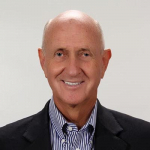 The common thread that permeates Warren Rustand’s s experience is one of vision, strategy, executive leadership, and achievement. He has created, led, and grown many successful private, public, and not-for-profit entities. He has a passion for family, entrepreneurship, public policy, and community. Warren’s background includes the following:
The common thread that permeates Warren Rustand’s s experience is one of vision, strategy, executive leadership, and achievement. He has created, led, and grown many successful private, public, and not-for-profit entities. He has a passion for family, entrepreneurship, public policy, and community. Warren’s background includes the following:
- Amazon Bestselling Author, “The Leader Within Us,” mentor, business strategist, advisor to CEOs and businesses globally.
- CEO Providence Service Corporation (NASDAQ) $2.1 billion social services and healthcare company.
- Managing Director SC Capital Partners an investment banking group
- Chairman and CEO of Rural Metro Corporation, a $500 million (NASDAQ) emergency services company.
- Chairman and Interim CEO TLC Vision (NASDAQ), a $400 million Lasik eye surgery company.
- Chairman/Director of more than 50 public, private, and not-for-profit organizations ranging in size from multi-billion-dollar companies to mid-size, early-stage, and startups.
- Selected as a White House Fellow following a nationally competitive process.
- Special Assistant to the Secretary of Commerce. Co-led the first-ever Executive Level Trade Mission to the former Soviet Union.
- Special Assistant to the Vice President of the United States.
- Appointments Secretary to the President of the United States
- Chaired the YPO/WPO public policy conference titled, “Public Policy and the Private Sector,” for 30 years in Washington DC
- Global Chair of WPO, an organization of 10,000 CEOs in over 100 countries.
- Co-Founder and Chair of L3, a worldwide leadership group, focused on one’s contribution during the second half of life.
- Co-Founder and Dean of Faculty/Learning at the EO (Entrepreneur’s Organization) Global Leadership Academy in Washington, DC.
- Undergraduate and Graduate degrees from the University of Arizona.
- Honors and Awards: The Visionary Leadership Award, Distinguished Citizen Award, 25 Year Achievement Award, Sports Hall of Fame, Robshaw Leadership Award, White House Fellowship,
- Honorary Lifetime Membership in EO, All American Academic Basketball Player, Member USA Basketball Team at World Basketball Championships, Drafted by the Golder State Warriors, Merrill
- Freeman Leadership Award, and Father of the Year Award.
- Warren is a frequent speaker on the subjects of leadership, business, family, and personal development.
For information on how to work with Don visit Work With Donk Williams
You can also reach out to Don Williams at https://donwilliamsglobal.com
Please join Don and his businesses in support of St. Jude’s Children Research Hospital in its Mission to cure Childhood Cancers. You can donate to St. Jude at stjude.org/donate
